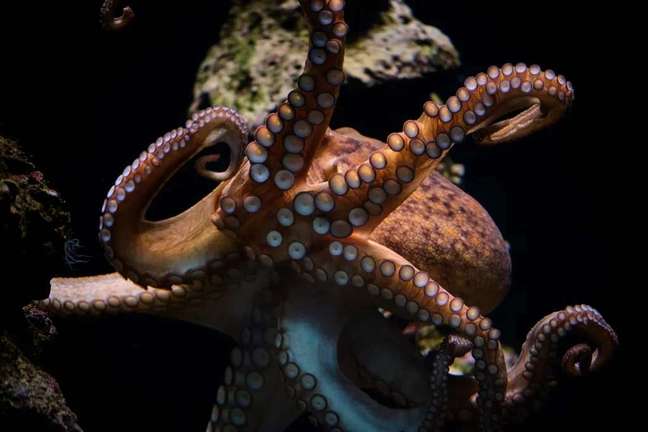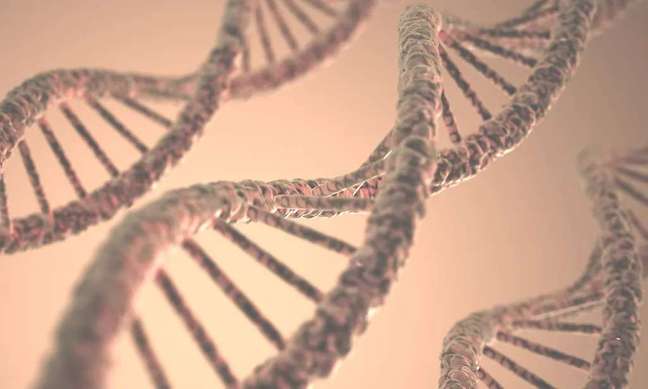Octopuses and their cephalopod relatives are very intelligent: biologists are studying the animals’ brains to find out what makes their organs complex
One of the animals that most intrigues science for his complexity and intelligence is the octopus🇧🇷 A team of scientists has now found a new link between our brain and that of curious cephalopods. It’s quite a large amount of microRNAs in brain tissue, which is actually very unusual among invertebrates, making the species unique in the seas.

- The photographer octopus becomes an attraction in the New Zealand aquarium
- Squid and crab feel pain and shouldn’t be cooked alive, according to a study
octopuses and squid they are very intelligent animals, the latter have been shown to have brains as complex as those of dogs, and we have already found some evidence that octopuses can dream, which is almost non-existent in invertebrates. Their nervous system is quite unusual, with much of the 500 million neurons scattered throughout the tentacles (hence the class name: cephalopod means “head” or “brain” in “feet”).

Each tentacle can make decisions on its own and even react to stimuli even after being detached from the body. The complexity of the system has long baffled scientists. Among the mysteries is the ability of animals to modify RNA at will to adapt to their environment. Normally this would start with DNA, but cephalopods rule out that intermediary. What is different, then, about animal RNA? This is what biologists have been trying to find out in this research.
RNA, microRNA and intelligence
Eighteen samples of deceased cephalopods were collected, obtained from the Italian marine research institute Anton Dohrn Zoological Station: among the species, there were common octopuses (vulgar octopus), Californian octopus (Bimaculoid octopus) and Hawaiian dwarf squid (Euprymna scolopes🇧🇷 Animal RNA has been sequenced, giving us the opportunity to study messenger RNAs and microRNAs involved in their genetic activities.
Tests have shown that octopuses have an unexpectedly large amount of microRNAs, or miRNAs: There are 164 of these genes grouped into 138 RNA families in the common octopus and 162 of the same 138 families in the California octopus. Of these, 42 were new families, mainly in brain and neuronal tissue. MiRNA molecules are non-coding, meaning they don’t convert into proteins and work in gene expression by binding to larger RNA molecules to help refine the proteins they create.

The large presence of molecules in animals suggests that they play an important role in cephalopod biology, although we don’t know exactly what it is. This expansion of miRNA families is the third largest in the entire animal kingdom: oysters, which are also molluscs, have acquired only 5 new families from their common ancestor with octopuses, while octopuses have acquired 90.
Such expansions have only been observed in vertebrates, albeit at different scales. There are about 2,600 mature miRNAs in the human genome: in octopuses the numbers are similar to those in chickens and frogs. This suggests that the animals’ complex intelligence could be related to this miRNA expansion.
In addition to this resemblance to us, the octopus brains they also have many transposons, or “jumping genes,” that enter the DNA from anywhere. The next step for biologists is to study the role of microRNA in cephalopods, which could already mean specialized neuronal functions required for the development of complex brains in animals.
Source: Smithsonian magazine🇧🇷 The progress of science
Trending on Canaltech:
- 10 series that ended in 2022
- Thanos lists the only 6 heroes he considers worthy enemies
- The 10 most watched series of the week (11/27/2022)
- The Menu | Meet the suspense movie that’s giving the talk
- 10 dangerous plants for dogs and cats
- The 10 most watched series of the week (11/20/2022)
🇧🇷The best content in your email for free. Choose your favorite Terra newsletter. Click here!
Source: Terra
Camila Luna is a writer at Gossipify, where she covers the latest movies and television series. With a passion for all things entertainment, Camila brings her unique perspective to her writing and offers readers an inside look at the industry. Camila is a graduate from the University of California, Los Angeles (UCLA) with a degree in English and is also a avid movie watcher.


![Un Si Grand Soleil preview: Tuesday, November 4, 2025 episode recap [SPOILERS] Un Si Grand Soleil preview: Tuesday, November 4, 2025 episode recap [SPOILERS]](https://fr.web.img3.acsta.net/img/6f/6d/6f6dc689d8fd8b69af5b4d56af2890e5.jpg)

-1hrdo3g2pvj1u.jpg)

